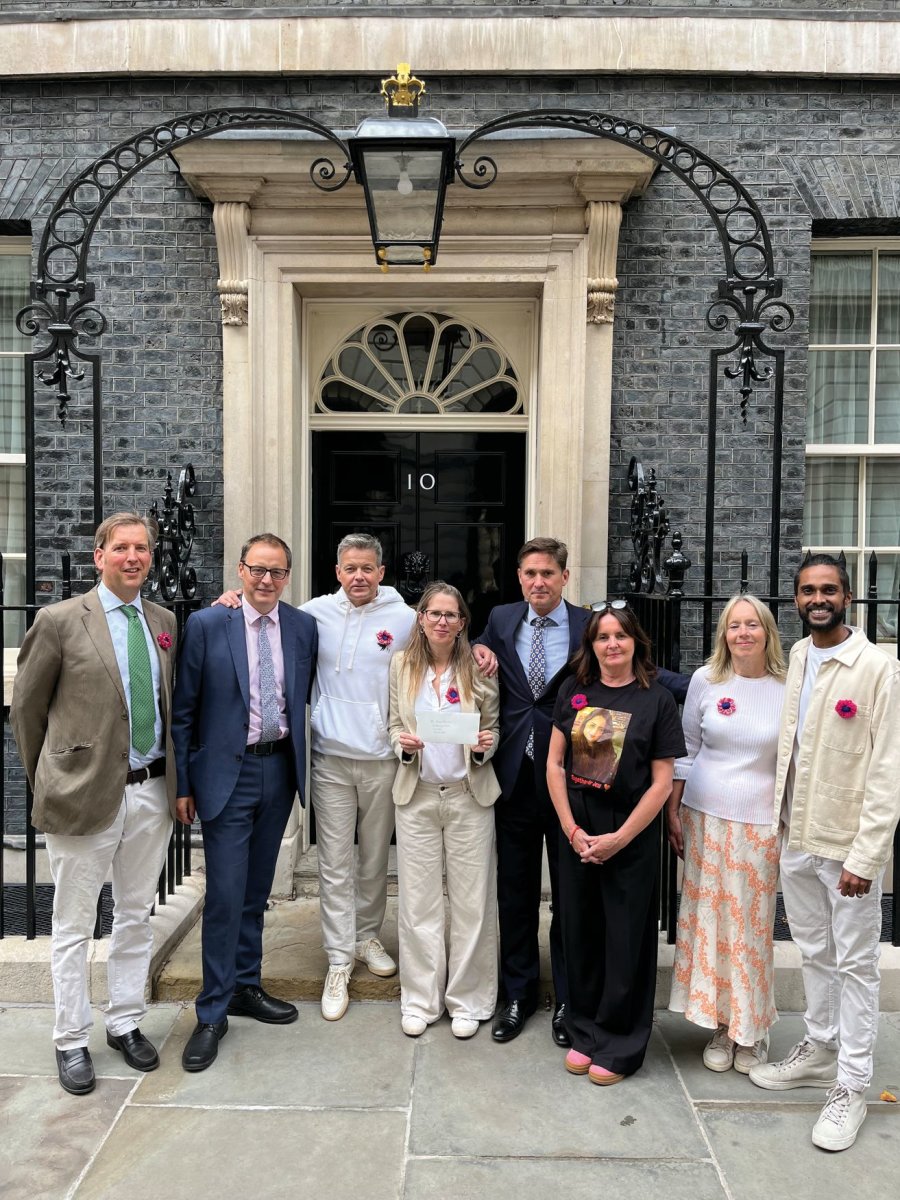
Campaigners outside No 10 (L-r) William Hotham, Scott Arthur MP, Pip Harding, Georgie Maynard, Charlie Maynard MP, Sarah Bainbridge, Dawn Emerton, Sam Suriakumar
8 min read
Investment in brain cancer research has been pitiful, but the new Rare Cancers Bill may finally change this. Sophie Church speaks to the team behind the legislation
Seamus Heaney’s last words were: ‘Do not be afraid’. I am not afraid, but I am fearful that this new and important approach may be put into the ‘too difficult’ box.”
In 2017, Labour grandee Tessa Jowell was diagnosed with glioblastoma, an extremely aggressive and rare form of brain cancer. A year later, frail from chemotherapy, Baroness Jowell gave her final speech in the House of Lords, calling for more funding and better access to new treatments for the disease – yet voicing concern this would never happen.
After Jowell’s death, the government announced it would double funding for brain cancer, to around £40m, in her memory.
Yet the former Blair-era cabinet minister had reason to fear. Today, only a fraction of that money has been spent; and in the past three years, just £600,000 has been invested in brain cancer research. Despite this, brain tumours are responsible for more deaths among children than leukemia. They kill more men under 70 than prostate cancer, and more women under 35 than breast cancer.
Rare cancer has been talked about from the despatch box, not just the backbenches
But now, a new Private Members’ Bill addressing rare cancers brought forward by Scott Arthur – the Labour MP for Edinburgh South West first elected last year – looks finally set to give glioblastoma, and other rare cancers like it, the attention they deserve.
The House has joined Arthur on a Zoom call, together with Liberal Democrat MP for Witney Charlie Maynard, the vice-chair of the Less Survivable Cancers All-Party Parliamentary Group, and Maynard’s sister Georgie, who is currently living with glioblastoma.
“A year ago, when I went to my party conference, I can remember being in the audience of a fringe event run by Siobhain McDonagh,” Arthur says of the veteran Labour MP for Mitcham and Morden.
“She dragged me on [to the panel] because she knew I’d won the Private Members’ ballot. It was number six, so it put me in a really good position. She was very gently trying to bully me into doing something in this broad domain. And here we are, a year later.”
Both Arthur and McDonagh have lost loved ones to glioblastoma: Arthur, his father-in-law Ivor Hutchison, and McDonagh, her sister Margaret, who served as a Labour general secretary under Tony Blair.
Ivor died within six months of his diagnosis. “We just thought that was bad luck,” says Arthur. “It wasn’t until I met Siobhain, and she explained that actually the prognosis for people with a diagnosis isn’t good – the average life expectancy after diagnosis is nine months.
“But the real tragedy is, that’s not really changed in terms of treatments for around 20 years or so because of the lack of investment in this area.”
Georgie was diagnosed with glioblastoma in 2023, after suffering a seizure. She was given 12 to 18 months to live.
“I’m incredibly lucky to have got to, what, about nearly two and a half years,” she tells The House today. “I look at my life, and the way that I can cope with it is to go: I’m lucky to have got to 47 and have survived those extra years, where I lost people in my 20s who I cared about a lot…
“But for the majority of people, understandably, whatever age it hits – we’re too young. For brain cancer in particular, it is the biggest cancer killer of children and under 40-year-olds. So, more than anything, this is a cancer that needs focus and attention.”

Georgie’s ‘Brain Cancer Justice’ group has long been calling on the government to spend the £40m pledged to brain cancer research.
But now, Arthur’s Rare Cancers Bill looks set to give the cause legislative heft. If passed, a ‘rare cancer’ would be defined in law for the first time. The government would also appoint a figure to help promote rare cancer research. Anyone who receives a rare cancer diagnosis will enter a single database indicating willingness to take part in a trial, unless they opt out.
“Trials are important because it means that patients in the UK can get early access to, hopefully, what would be groundbreaking treatments,” he says.
Conservative MP for Kingswinford and South Staffordshire Mike Wood, whose staffer Dan Horrocks has undergone treatment for cancer multiple times, cannot stress enough the importance of bringing trials to the UK.
“Despite being a young man in his 30s, Dan’s obviously suffered his fourth brain tumor, and at the moment the research is very sketchy in terms of trials available in this country,” Wood tells The House.
Horrocks, who has worked for Wood since 2015, has just undergone six months of treatment for brain and spine cancer. Told the cancer may return, Horrocks is now trying to raise £55,541 to travel to Houston for further tests.
I can actually say, ‘I’m doing something about this’ – that’s powerful
“Cases like that desperately need the clinical trials, the research, and the currently ‘orphaned drugs’ [which pharma companies may be unwilling to invest in, given the rarity of the diseases they are designed to treat] to be made, obviously, ‘unorphaned’ – to become adopted – to allow for people like Dan to receive effective treatment, so that they can watch their children grow up.”
Arthur’s bill now seeks to introduce tax incentives for pharma companies to invest in UK-based rare cancer research.
“This happens a little already in the EU for paediatric drugs, where if a drug is developed for use in an adult condition, they get a slightly extended patent period if they agree to trial against children,” Arthur says. “The idea is that we look at the feasibility of doing that just for cancer treatments.”
After some hiccups in the Commons – Conservative MP Christopher Chope initially brought forward then withdrew amendments that may have risked government support for the legislation – the bill is currently at Second Reading in the Lords. The team are now quietly confident it will pass.
But why is progress on rare cancers, including brain, only just being made?
Arthur credits a Labour government that has been particularly affected by cancer. Health Secretary Wes Streeting is a cancer survivor himself, while health minister Ashley Dalton is living with incurable cancer. Health minister Zubir Ahmed lost his aunt and father-in-law to glioblastoma. Former health minister Andrew Gwynne, who Arthur says was a “fantastic help” in guiding the bill, lost both of his parents to cancer.
“If you check for the term ‘rare cancer’ – and it’s not, of course, just my bill – it’s been mentioned way more times in the past year than it was in all of the last five years,” says Arthur. “It’s been talked about from the despatch box, not just the backbenches.”

For Maynard, ratifying this legislation is just the start. With Parliament showing what can be achieved in the rare cancer space, he implores the government to now focus on all six less-survivable cancers: lung, liver, brain, stomach, oesophageal and pancreatic.
“We desperately, desperately, desperately need the government to be focused, in their cancer plan in December, on going after those six,” he says. “You look at the survival rates going across the table, and a lot of them have gone from 20 per cent to 70 per cent. These ones are down at the bottom left – stationary.”
With patients dying so quickly from such cancers, pharma companies have been hesitant to invest in drug research and development. But there are benefits for the government in positioning the UK as a centre for investment, says Maynard.
“It has the opportunity to attract resources and people and ideas into the UK, which would be good morally and medically, but also economically.”
Pledging to double survival rates for these six cancers in the next 10 years is the “single best plan” Maynard has heard: “That’s what I want to see the government commit to.”
Can he imagine Labour making such a promise?
“Bluntly, they’re not going to be in government for the next 10 years, so why the hell not?”
For now, the group recognises that this legislation won’t be an overnight fix. “For a lot of the people who were diagnosed on the day that I won the Private Members’ Bill, the chances are that they’re already passed away,” Arthur says heavily.
But being able to point to any kind of progress on rare cancers humbles the new MP.
“When I read some of the things that the charities say about the bill, in terms of the difference they hope it could make, I do feel the weight of it,” he says.
“For people who are faced with awful situations, I don’t have to say to them, ‘I’ll hold you in my prayers’, or ‘I’ll be thinking about you’. I can actually say, ‘I’m doing something about this’ – and that’s powerful.”

